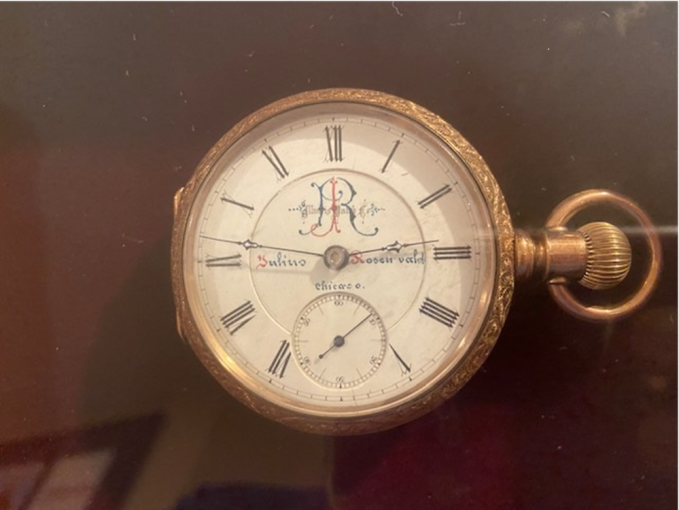The Smithsonian’s National Museum of American History has added a gold pocket watch to its collections that once belonged to Julius Rosenwald (1862–1932), a philanthropist and businessman who made his fortune in the Sears Roebuck retail catalog company. The pocket watch was donated by Tom Stern, Rosenwald’s great-grandson, who was inspired by his great-grandfather’s generous approach to giving and philanthropy during his lifetime.
The watch, along with artifacts from collections in philanthropy, business history, medicine and numismatics will be on view May 15 between 1:30 and 3:30 p.m. for an Objects-Out-of-Storage event to mark Jewish American Heritage Month.
Born to German Jewish immigrants in Springfield, Illinois, Rosenwald worked in the clothing and tailoring industry in New York City before moving to Chicago and opening a clothing manufacturing company. Rosenwald later joined the Sears Roebuck retail and mail-order catalog company at the invitation of his brother-in-law, Aaron Nusbaum. As a partner in the company, Rosenwald secured financing from Goldman Sachs through his friendship with Henry Goldman. The funds allowed Sears, Roebuck and Co. to launch its initial public offering (IPO) on the stock market in 1906, the second IPO in American history.
Rosenwald supported various charities, causes and educational institutions with the fortune he earned at Sears, Roebuck and Co. Notably, he donated millions of dollars to build thousands of rural schools in the South for Black students, which were also funded by Black communities under Rosenwald’s matching-gift model. A complicated figure, Rosenwald worked within the system of racial segregation while also pushing white Southern leaders to support Black public education through the terms of his giving. Moreover, he supported individual desegregation efforts in white educational institutions. Breaking away from the philanthropic norm of his day, Rosenwald operated his foundation with a spend-down approach and stipulated that it spend its assets within 25 years of his death. The Julius Rosenwald Fund did just that in 1947, 15 years after his death.
Rosenwald’s life left an impact on his great-grandson. Stern said that Rosenwald’s philanthropic actions served as his “North Star,” motivating him to become sober after struggling with a drug and alcohol addiction. He received the pocket watch as a gift from his father in recognition of his sobriety and decision to turn his life around, and he later established a successful career in the recruiting and entertainment industries. Stern’s donation reflects his great-grandfather’s philosophy of giving in the present moment, rather than the future.
Designed by the Illinois Watch Co. in the 1870s, Rosenwald’s Stuart-grade pocket watch has a gilt finish with a stem-wound, lever-set mechanical movement. The watch is open-face and allows a clear view of the dial, which is customized with Rosenwald’s name and initials. According to an appraisal, the watch case is made from 14-karat yellow gold. Rosenwald likely wore this watch with his suits as he conducted business, fastening it with a gold chain. At this time, there are no immediate plans to place the pocket watch on display.



